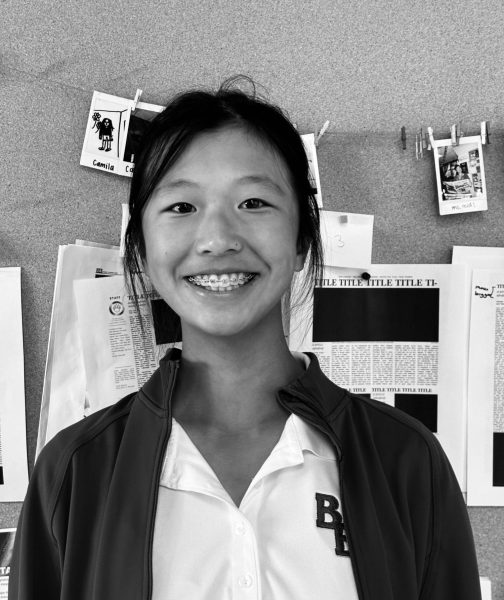Shane Stafford and Sandy Berkowitz were originally debate rivals. Now married, they coach debate together.
The first time they met, they were at a tournament at Princeton University. After the debate, they kept seeing each other at local tournaments. They started dating, married in 1987, and decided to get their masters together. They passed on their passion to their daughter, Hana Stafford ‘13, who debated for Rutgers University and now coaches debate and teaches English at Success Academy in New York City.
Stafford has coached debate since 1979 and for the past 15 years, he has taught Argumentation/Debate, Advanced Debate, and Senior Seminar and coached debate at Blake. Stafford and Berkowitz have also been coaches for the USA Debate Development Team for 10 years, which Jack Johnson ‘20, Edward Adams ‘21, Connor Yu ‘18, and Elizabeth Terveen ‘23 have all been on. They meet with Freshmen and sophomores all over the country to coach debate and have been to Bali, Croatia, and Germany for tournaments.
Stafford uniquely asks his students only two questions after a tournament: “Did you have fun and did you learn something?”
Terveen explains that “the two questions he asks are a very genuine reflection of his teaching style and view on debate – he values hard work and progress over winning.”
Sofia Perri ‘23 agrees saying, “This is super key to debate in general…Shane makes debate about what it should be, which is obviously learning and doing something that excites you intellectually…I like how he deemphasizes [whether you won or lost].”
Despite the debate program’s eight state championships and six national championships, students feel no pressure from Stafford to win tournaments and receive trophies. Tess Dayhoff ‘25 explains, “Obviously, you want to do your best, but he never is pressuring [you to] do well here, [or saying] you have to win. He never does that.”
Stafford’s debating philosophy focuses more on process and growth. He explains, “[Debate] is good for your failure resume… When you fail, you grow more sometimes than when you’re successful. Sometimes, there’s going to be someone a little bit better, you’re always going to lose rounds, there are going to be things you can’t control. I think those are all good life experiences to get better at just life in general.”
He also emphasizes the idea of “redos.” When his students lose for a certain reason, he encourages them to further refine their skills, find ways to beat the argument, and not do the same thing next time. Stafford adds, “If you want to be good, then you need to do two things, you need to work hard and [listen] to coaching. If you do those two things, I feel like no matter what your basic raw skills are, you’re [going] to get better.”
Stafford highlights this willingness to work. He says, “I don’t think you need any particular skills to begin except the desire to work hard and spend some time on it.” Rather, as he explains, “It’s one of the best ways [for] you to develop [skills in] speaking, critical thinking, research, and confidence.”
Terveen has experienced this growth as a result of going through the program and Stafford’s continuous help, explaining, “He encouraged and supported me as a young debater, when I didn’t have a lot of experience and wasn’t particularly skilled. Having someone who appreciated my work ethic and believed in my potential was incredibly influential in my decision to stick with the activity.”
Perri shared a similar experience. During her first few years of debate she didn’t put that much work into it because of gymnastics, but during Junior year she decided to really focus on debate. She explains, “He had no obligation to [listen] given the past two years,” but he still trusted her, gave her attention, coaching, a partner, and abundant resources, which “completely turning my debate career around.”
Another aspect that Stafford emphasizes is having fun and enjoying debate. He admits that debate is difficult so “you got to enjoy it.” He explains how “you don’t have to commit your life to it, you can still do it and be successful in everything else, but [on] some level, if it’s not enjoyable it’s going to be a lot harder.”
Stafford has undoubtedly had a huge impact on the debate program and his students don’t stop singing his praises. “Shane is an amazing coach who is incredibly supportive of Blake debaters. He cares about you personally, will help you succeed, but will still support you even if you don’t find success immediately,” says Terveen.
Perri agrees, adding, “I think he dedicates so much to the debate team, sacrifices so much time, energy, and really, really, cares about all of the students. [He] gives everyone second chances, attention, resources, even if arguably they don’t deserve them. [He] does so much more than people realize behind the scenes.”
As demonstrated, Stafford doesn’t care about winning or accomplishments. Rather, his goal is for debaters “to leave this team changing the world [and] making the world more fair.”


![Stafford stands in front of the debate team’s extensive trophy
case. Not pictured: the rest of the trophies that sit outside of the
debate room. Terveen notes, “[There is] definitely no [pressure to
win]. Although he is of course very proud when teams do well!”](https://www.blakespectrum.org/wp-content/uploads/2023/03/IMG_7895-675x900.jpg)










